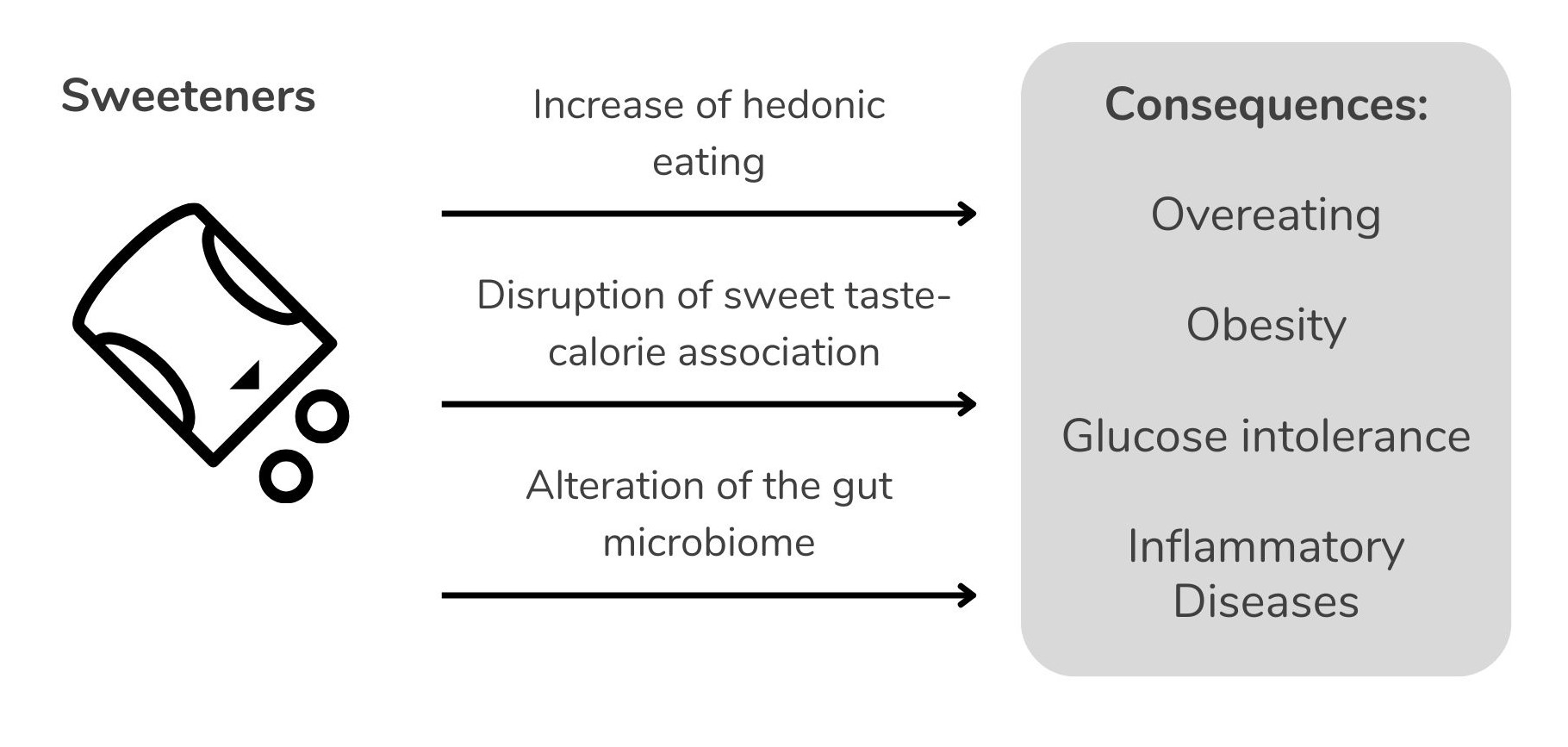
Major points:
- Sweeteners give food a sweet taste, but unlike sugar, they contain fewer or no calories. Since the 1980s, their use in the food industry has dramatically increased.
- Sweeteners can cause overeating since they make food taste deliciously sweet, disrupt the association between sweet taste and calories, and alter the gut microbiome.
- Sweeteners are consistently avoided in Neatic.
What are sweeteners?
Sweeteners give foods a sweet taste without using sugar. They are sweet-tasting sugar substitutes. Most sweeteners are so-called non-nutritive sweeteners since they provide minimal to no calories. Their sweetness is much higher compared to sugar.
The following non-nutritive sweeteners are permitted in Europe:
- acesulfame (E 950)
- aspartame (E 951)
- cyclamate (E 952)
- saccharin (E 954)
- sucralose (E 955)
- thaumatin (E 957)
- neohesperidine (E 959)
- stevioside (E 960)
- neotame (E 961)
- aspartame acesulfame salt (E 962)
- advantame (E 969)
Sugar alcohols are another type of sweetener. They provide fewer calories and less sweetness compared to sugar. The following sugar alcohols are permitted in Europe:
- sorbitol (E 420)
- mannitol (E 421)
- isomalt (E 953)
- polyglycitol syrup (E 964)
- maltitol (E 965)
- lactitol (E 966)
- xylitol (E 967)
- erythritol (E 968)
Non-nutritive sweeteners and sugar alcohols are referred to as “sweeteners” on the ingredient list.

Why are sweeteners used by the food industry?
There are several reasons for the use of sweeteners in food.
They give food a sweet taste just like sugar, but contain fewer calories or none at all. Because of the use of sweeteners, there are numerous artificially sweetened beverages, which have significantly fewer calories compared to their sugar-sweetened counterparts.
Sweeteners are tooth-friendly. Sugar causes tooth decay, sweeteners do not. That is why sweeteners are found in many candies and chewing gums.
Sweeteners are cheaper on average compared to sugar which encourages their use.
Since the 1980s, the use of sweeteners increased dramatically, especially in beverages and for low-calorie sweetening.
How do sweeteners cause overeating and obesity?
Sweeteners add a delicious sweetness to foods and make them irresistible. You eat more, even though your calorie requirement has long been met. This eating for pleasure is called hedonic eating.
Sweeteners increase hedonic eating!
In addition, sweeteners disrupt the experience of sweet taste from calorie intake.
For thousands of years, a sweet taste meant that sugar and calories were absorbed through food. Even before swallowing sweet foods, your body prepares to digest sugar. Metabolic processes are started, body temperature rises slightly, enzymes and hormones are released.
With sweeteners, the situation becomes confusing for your body. Because a sweet taste can now also mean that your food contains neither sugar nor calories. Thus, a sweet taste loses its predictive function for sugar and calories. Experts speak of a disruption of the sweet taste-calorie association.
What happens in this confusing situation? You eat more. Because the risk of starvation is much more dangerous than being overweight.
Sweeteners disrupt the sweet taste-calorie association!
Sweeteners lead to changes in the gut microbiome. This altered bacterial colonization of the intestine is associated with increased body weight, as well as chronic inflammatory bowel diseases and glucose intolerance including type 2 diabetes mellitus.
Sweeteners alter the gut microbiome!
This is not just theory: sweeteners are used and marketed as animal feed additives due to their weight-increasing effects. The advertising promises that sweeteners increase the animals’ feed intake and body weight. Animal studies prove the scientific basis of these claims.
In humans, artificially sweetened beverages have been studied in particular. They are advertised as calorie-free or low-calorie alternatives to sugar-sweetened beverages. The consumption of artificially sweetened beverages has been linked to body weight gain and metabolic disease. This link is particularly strong in people who are already overweight or obese.
Do sweeteners have advantages over sugar?
Sweeteners are tooth-friendly. Unlike sugar, they do not promote the development of tooth decay.
What does Neatic recommend concerning sweeteners?
In Neatic, sweeteners are consistently avoided due to their appetite and weight-increasing effects. The approach is summarized in Principle 2.
Principle No. 2
If the term “sweetener” is found on the ingredient list, avoid these foods.
More information about the principles can be found here.

Bibliography:
Basson, Abigail Raffner; Rodriguez-Palacios, Alexander; Cominelli, Fabio (2021): Artificial Sweeteners: History and New Concepts on Inflammation. Front Nutr 8, p. 746247. DOI: 10.3389/fnut.2021.746247.
Bundesinstitut für Risikobewertung (2014): Bewertung von Süßstoffen und Zuckeraustauschstoffen, Hintergrundinformation Nr. 025/2014. Available online at https://www.bfr.bund.de/cm/343/bewertung_von_suessstoffen.pdf, checked on 1/2/2023.
Chia, Chee W.; Shardell, Michelle; Tanaka, Toshiko; Liu, David D.; Gravenstein, Kristofer S.; Simonsick, Eleanor M.; Egan, Josephine M.; Ferrucci, Luigi (2016): Chronic Low-Calorie Sweetener Use and Risk of Abdominal Obesity among Older Adults: A Cohort Study. PloS one 11 (11), e0167241. DOI: 10.1371/journal.pone.0167241.
Shearer, Jane; Swithers, Susan E. (2016): Artificial sweeteners and metabolic dysregulation: Lessons learned from agriculture and the laboratory. Rev Endocr Metab Disord 17 (2), pp. 179–186. DOI: 10.1007/s11154-016-9372-1.
Suez, Jotham; Cohen, Yotam; Valdés-Mas, Rafael; Mor, Uria; Dori-Bachash, Mally; Federici, Sara; Zmora, Niv; Leshem, Avner; Heinemann, Melina; Linevsky, Raquel; Zur, Maya; Ben-Zeev Brik, Rotem; Bukimer, Aurelie; Eliyahu-Miller, Shimrit; Metz, Alona; Fischbein, Ruthy; Sharov, Olga; Malitsky, Sergey; Itkin, Maxim; Stettner, Noa; Harmelin, Alon; Shapiro, Hagit; Stein-Thoeringer, Christoph K.; Segal, Eran; Elinav, Eran (2022): Personalized microbiome-driven effects of non-nutritive sweeteners on human glucose tolerance. Cell 185 (18), 3307-3328.e19. DOI: 10.1016/j.cell.2022.07.016.
Swithers, Susan E. (2015): Not so Sweet Revenge: Unanticipated Consequences of High-Intensity Sweeteners. Behav Anal 38 (1), pp. 1–17. DOI: 10.1007/s40614-015-0028-3.
